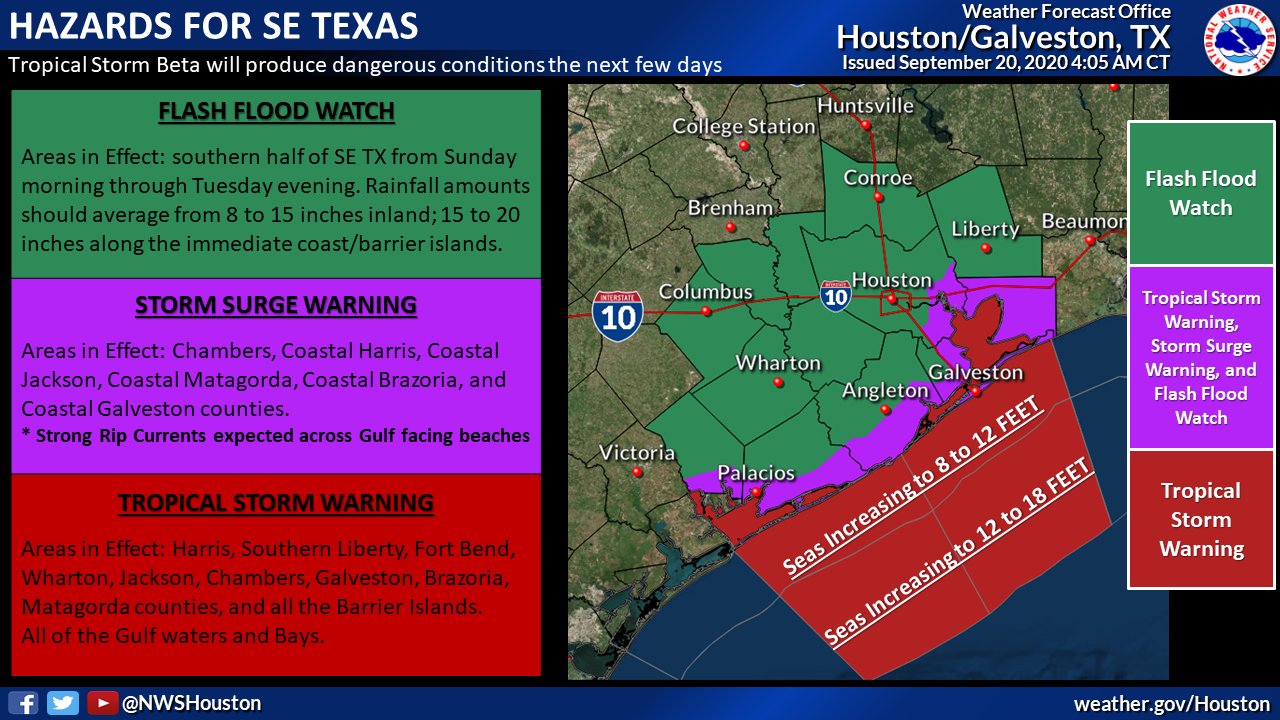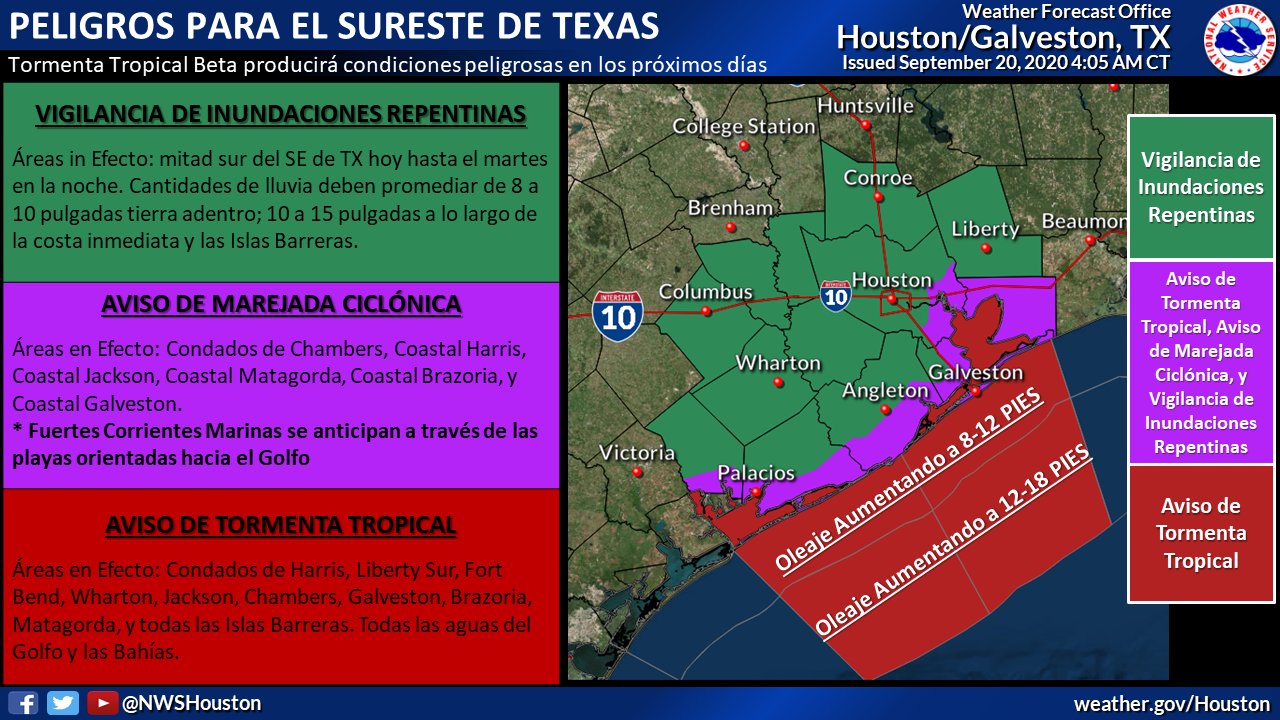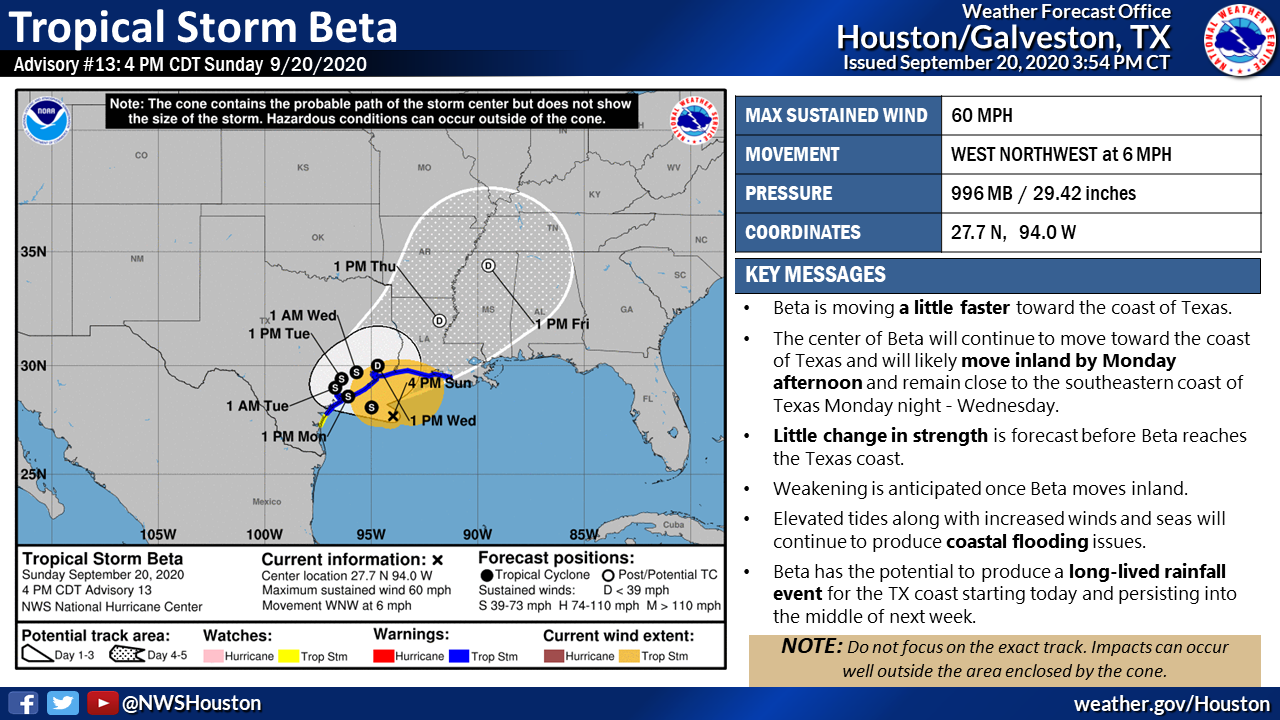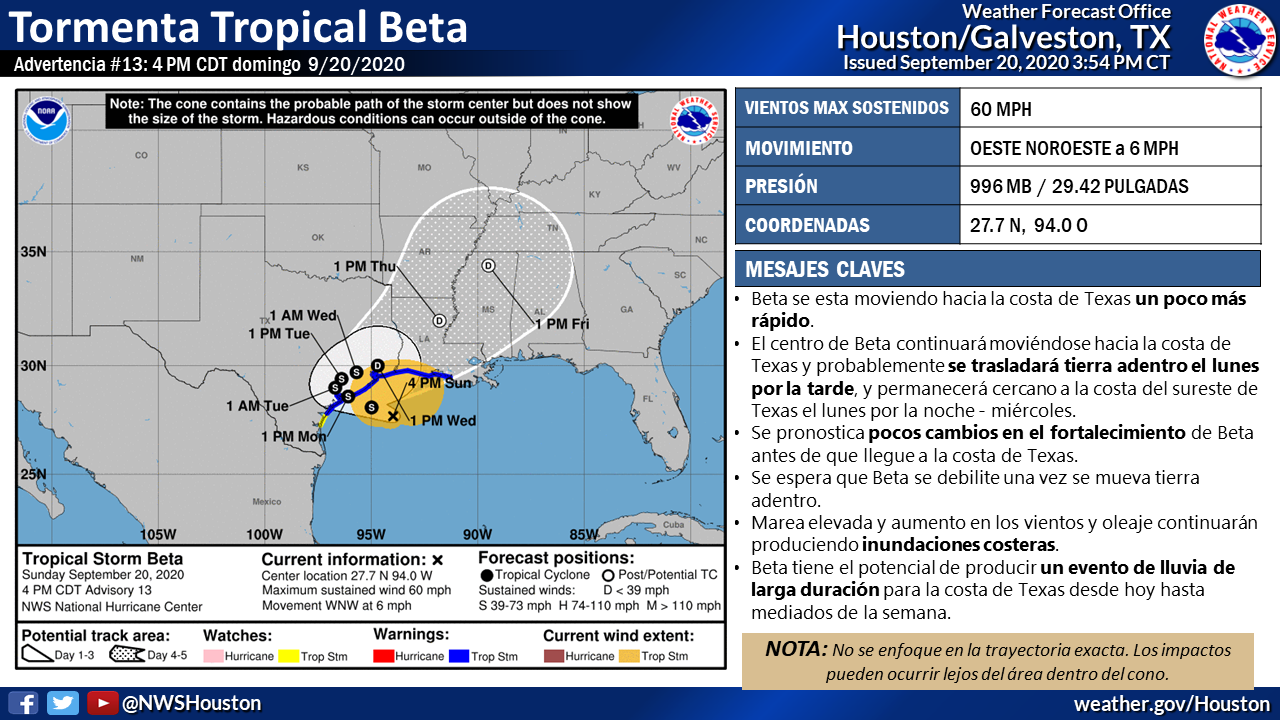The National Weather Service has extended a Tropical Storm Warning to include inland Harris County and has issued a Storm Surge Warning for coastal Houston. A Flash Flood Watch is also in effect for Houston from Sunday morning through Tuesday evening. A Tropical Storm and Storm Surge Warning are still in effect.
Prolonged heavy rainfall from Tropical Storm Beta will have the potential to produce 15-20 inches of rainfall along the coast and around 8-15 inches inland. This prolonged period of rainfall will have the potential to produce life-threatening street and structure flooding.


A Tropical Storm Warning means tropical storm-force winds are expected somewhere within this area within the next 36 hours. A Storm Surge Warning means there is a danger of life-threatening inundation, from rising water moving inland from the coastline, somewhere within this area within the next 36 hours.


Although attempting to better organize itself earlier this afternoon, Tropical Storm Beta continues to battle dry air and wind shear as it moves west-northwestward towards the middle Texas coastline.
Beta remains on track to make landfall near Matagorda Bay late Monday, then take a turn to the northeast Tuesday through Thursday. Arrival of tropical storm force winds is most likely Monday morning, but could arrive as early as this evening.
We continue to anticipate a prolonged heavy rainfall and coastal flooding event from Beta with elevated tides already occurring bringing coastal flooding. Coastal flooding will remain a threat through midweek with the worst of the storm surge anticipated on Monday and Tuesday.
The first rainbands from Beta have started to move onshore today, but the heaviest rain will not occur until Monday into Tuesday. Generally 8 to 12 inches of rain is expected with locally higher amounts higher along the immediate coast.
The combination of storm surge and heavy rainfall along with high tides will elevate the risk of dangerous flooding along the Barrier Islands and inner coastal locations through mid-week.
There are currently no evacuation orders in place for Houston. Please monitor our channels for updates; the storm surge and flash flooding impacts of Beta will have the potential to be life-threatening.
What the City is Doing
The City is preparing emergency response resources to be able to meet the public safety needs of residents during the storm:
-
- Houston Health Department-affiliated COVID-19 testing sites are closed until further notice due to Tropical Storm Beta. Updates will be provided as new information is available.
- Houston Public Works (HPW) will temporarily lower Lake Houston to 41.5 feet in anticipation of Tropical Storm Beta. Property owners should secure property along the shoreline.
- HPW has also deployed barricades at flood-prone locations. View our maps of these locations here.
- HPW, the Houston Fire Department, and the Houston Police Department are preparing staff, facilities, and equipment for any response needs. HPW staff are also preparing debris removal equipment.
- The Fleet Management Division is pre-staging vehicles and equipment to to assist with fueling response vehicles and are preparing facility generators.
- Houston Airports is currently reviewing its hurricane plans and checklists, which includes coordinating with all stakeholders and airlines at IAH and HOU. Passengers who are flying out in the coming days need to check with their airline for delays or cancellations. Fly2Houston.com will also include important information for passengers.
Take Steps to Prepare:
Prepare your home and review your plans before a storm impacts the area.
- Ensure your family has 5-7 days of food, water, and necessary supplies.
- This includes enough prescription medication for at least this duration, in case pharmacies and doctor's offices are closed.
- Consider the unique needs of small children, seniors, special needs family members, and pets.
- Decide what you and your family will do if the storm impacts your area. Most City of Houston residents are not vulnerable to storm surge and do not need to evacuate before a hurricane or tropical storm. Vulnerable residents who require electricity may also consider evacuation in advance of a major storm. For a map of hurricane evacuation zones and mandatory evacuation areas, visit: houstonoem.org/hurricanes
- Develop a family communication plan, so that you know who to check in with after a storm. Visit readyhoustontx.gov for more information on developing a plan.
- Know how to turn off your utilities. This includes electricity, water, and gas. Only turn off gas if instructed by local officials or by CenterPoint Energy.
Houstonians should also register for AlertHouston at www.AlertHouston.org for additional updates.
Houston residents who might need additional assistance in evacuating during a disaster can register for the State of Texas Emergency Assistance Registry (STEAR). STEAR allows residents to provide information on their specific situation to emergency management officials who will work to help them evacuate safely or provide them with the appropriate life-sustaining help they need in a disaster. Call 2-1-1 or visit https://bit.ly/HOUSTEAR for more information.
Acciones de Protección
Pasos para tomar ahora:
- Asegure comida, agua, y provisones necesarios para 7 días.
- Esto incluye suficiente medicamentos con receta durante este tiempo en caso que las farmacias y las oficinas de medicos estén cerradas.
- Considera necesidades unicas para niños pequeños, personas mayores, miembros de familia con necesidades especiales, y mascotas.
- Decide que va hacer su familia si la tormenta impacta a su área. La mayoria de los residentes en la Ciudad de Houston no son vulnerables a oleadas de tormentas y no necesitan evacuar antes de un huracán o una tormenta tropical. Residentes vulnerables quienes requieren eléctricidad quisas también pueden consideren evacuar antes de una gran tormenta. Para un mapa de zonas de evacuación durante huracánes y zonas de evacuación obligatorias, visite: houstonoem.org/hurricanes
- Desarolla un plan de comunicación familiar para saber con quien comunicarse después de una tormenta. Visite readyhoustontx.gov para más información sobre cómo desarollar un plan.
- Sepa cómo apagar sus servicios públicos. Esto incluye eléctricidad, agua, y gas. Solamente apague la línea de gas si es dicho por oficiales locales o por CenterPoint Energy.
Algunos residentes tal vez requieren asistencia adicional para dejar sus hogares o si responden a una emergencia solo/a. El programa de STEAR le da la oportunidad a residentes para registrarse para asistencia en caso de un desastre. Resgístrase a sí mismo o a alguien más hoy por marcando al 2-1-1 o por visitando a www.TexasSTEAR.org.
Registrese para mensajes basados en ubicación por AlertHouston, el sistema oficial de notificaciones de emergencias de la Ciudad de Houston: www.AlertHouston.org.
Monitorea fuentes oficiales de información: Rumores y información falsa pueden ser común antes y durante tormentas. Es importante buscar información de fuentes confiadas.
Fuentes confiadas incluyen: Centro de Información de Emergencias de la Ciudad de Houston (www.houstonemergency.org), Harris County Flood Warning System (harriscountyfws.org), Houston TranStar (houstontranstar.org), y la Oficina del Servicio Meteorológico Nacional de Houston/Galveston (weather.gov/hgx)
PREPARING FOR HURRICANES DURING THE COVID-19 PANDEMIC; PREPARACIÓN PARA HURACANES DURANTE LA PANDEMIA DEL COVID-19
Planning for hurricane season and other potential disasters can be stressful, and because the 2020 hurricane season comes during the COVID-19 pandemic, it may be especially so. Understand that your planning may be different this year because of the need to protect yourself and others from COVID-19: https://bit.ly/hurricanecovidprep
Planificar para la temporada de huracanes y otros desastres potenciales puede ser estresante y, debido a que la temporada de huracanes del 2020 llega durante la pandemia del COVID-19, podría ser especialmente estresante: https://bit.ly/hurricanecovidprep
